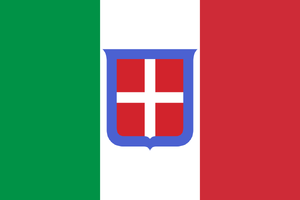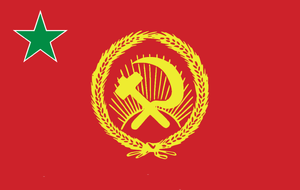Italian Empire
The Italian Empire (Regno d'Italia) is a country in Southern Europe. It borders the French State to the west; Switzerland and Germany to the north; Croatia to the east; and completely surrounds San Marino and the Vatican. Italy, being a peninsula, has a vast coast along the Mediterranean sea, as well as control over the largest Mediterranean islands, Sardinia and Corsica.
The Italian Empire also has land borders with Turkey, Iberia and Tunisia once their direct colonial holdings in the Mediterranean Sea and North Africa are taken into account.
Autonomous colonial governments operate throughout various regions of the empire. These regions include the Kingdom of Albania, Kingdom of Montenegro, Kingdom of Tunisia, Kingdom of Egypt, four countries with puppet monarchies that are controlled directly by Italy, the Governorate of the Levant, a territory under a military government in the Middle East, the Governorate of the Gulf, a colony along the Persian Gulf, and Italian East Africa, a colonial holding on the Horn of Africa.
History
"Fascist Era" is the era of National Fascist Party government from 1922 to the start of 1962 with Il Duce Galeazzo Ciano as head of government. The fascists imposed totalitarian rule and crushed the political and intellectual opposition while promoting economic modernization, traditional social values and a rapprochement with the Roman Catholic Church. The fascist government passed through several relatively distinct phases. The first phase (1923–1925) was nominally a continuation of the parliamentary system, albeit with a "legally-organized executive dictatorship". Then came the second phase, "the construction of the Fascist dictatorship proper, from 1925 to 1929". The third phase, with less activism, was 1929 to 1934. The fourth phase, 1935–1940, was characterized by an aggressive foreign policy: war against the Ethiopian Empire, which was launched from Eritrea and Italian Somaliland; confrontations with the League of Nations, leading to sanctions; growing economic autarky; and the signing of the Pact of Steel. The war itself was the fifth phase with successes and victories in Africa, the Mediterranean Sea and the Middle East leading to the formation of the Italian Empire.
Italy was an essential member of the Axis powers in World War II until it left and formed the Triumvirate after the war.
Situation
In 1962, after Mussolini's death, the mantle of Duce of Fascism passed on to his chosen successor, Galeazzo Ciano. Ciano is very devoted to the preservation his father-in-law's legacy and appears chronically unwilling to do anything to even slightly change what Mussolini has created.
Economy
The Italian economy is rather lively. Italy has greatly benefitted from the Triumvirate and the trade treaties that came with: being at the center of the Mediterranean and between the other two major members of the alliance, the country has become a trade hub and an exchange ground for most trade convoys in the area, allowing Italian enterprises to slowly get back to business. While not yet fully recovered, analysts are mostly confident that the Italian economy will keep its current trend of moderate growth.
Military
From a military point of view, Italy has changed much since the war: while the start of the hostilities in 1940 found the Italian armed forces corrupted and utterly unprepared, lagging behind in both technology and training, a mixture of much needed German aid and (very) painful lessons allowed the Italian high command to slowly put the armed forces back to shape, and revert the tide of defeats suffered in the colonies. Slowly but steadily, Italy managed to fill the gap, and inflicted unexpected defeats against the Franco-British army in the colonies taking Algeria and Egypt with German help, and keeping Italian East Africa despite the complete isolation, thanks to a strange mix of unconventional tactics, knowledge of local terrain and sheer refusal to surrender.
In 1962, the Italian armed forces are the second strongest in Europe after the German Heer, and the fourth in the world after Germany, Japan and the United States. The strongest and most funded military asset of the Italian Empire is undoubtedly the navy: the "Regia Marina" holds complete dominance of the Mediterranean, dwarfing the Spanish and Turkish fleets and serving as a constant reminder to the Kriegsmarine that the Mediterranean is "Mare Nostrum," and not a German holding. The conformation of the Mediterranean sea, dotted by small islands, has led the Italian Admiralty to focus on large battleships and smaller carriers, with the latter mostly serving as escorts to the former and loaded with fighter wings to protect the more vulnerable dreadnoughts from enemy bombers: the fleet's torpedo bombers and larger aircraft are stationed on land, allowing for much larger support wings with a small delay. While most of the Navy is kept near the mainland of Italy, smaller detachments are stationed in the Red Sea and around the Arabian peninsula, protecting precious oil shipments from the rich colonial oil fields.
The Italian Royal Army, or "Regio Esercito," while not as present in the propaganda posters, is well armed and trained, with specialised units for each terrain. While Italy fields some modern armored divisions modeled after German Panzerdivisionen, the terrain of both mainland Italy and the colonies - mostly hills, mountains or even deserts - makes it more advantageous to focus on different aspects of war: motorized divisions are perfect for quickly redeploying troops, and versatile enough not to be hindered by rough terrain; the "Alpini" mountain troops are adept at fighting on the most difficult terrains, from the Alps to the Ethiopian canyons, while desert corps, marines and paratroopers are used to secure critical assets should the situation require it. Finally, large units of "Ascari" formed from the colonial natives ensure that Italian holdings outside the mainland can quickly react to any threat.
Finally, the air force, or "Regia Aeronautica," while not as big as the gargantuan Luftwaffe, is modern and extensive, ranging from nimble fighters to bomber wings. From the very birth of fascism, many of its founders, from Gabriele D'Annunzio to Italo Balbo, were fascinated with air travel, for reasons both cultural and military: especially the latter encouraged private flight as a sport, and was a firm proponent of air support and aerial operation, founding the "Fanti dell'Aria" as the first paratrooper unit within the Italian armed forces.
Colonies
Italy holds large swathes of colonial lands in both Africa and Arabia, mostly gained after the war as a reward for the help given to Germany in defeating the Allies across the Mediterranean: to the pre-war colonies of Libya and Italian East Africa (comprising Ethiopia, Eritrea and Somalia) were added Tunisia, Egypt (kept as a formally independent protectorate), the Levant (much to the chagrin of Turkey), the oil-rich British protectorates in Arabia and smaller British holdings south of Ethiopia, later incorporated into Italian East Africa.
The colonial situation is rather stable, compared to other colonial empires: while resistance exists throughout Italy's large colonial holdings, it is nowhere near the extent of what happens in the German Reichskommissariats and in the East Asian Co-Prosperity Sphere. This is mainly due to what is perceived by many as Italy's weakness, but this time has acted beneficially: since Italy lacks the military and economical power to crush resistance with brute force, Italian colonial authorities prefer discussion and compromise with local authorities to mindless repression, and Italian governors are known for either their warm attitude towards the natives (such as Amedeo di Savoia-Aosta, Viceroy of Italian East Africa) or their diplomatic skills at keeping peace through subtle means (such as Carlo Alberto dalla Chiesa, governor of the Italian Levant). While extremists, fanatics and terrorists still exist, the majority of Italy's colonial subjects can be said to at least tolerate Italian rule.
Diplomacy
Diplomatically, Italy stands at a crossroads. While the Italian Empire is the de facto leader of the Triumvirate, the reason it was born (to oppose German imperialism) is fading, and the other two members, Iberia and Turkey, are complaining more and more, due to conflicting territorial interests: since Spain and Turkey remained neutral during opening of the war, Italy had the lion's share of the defeated countries' colonial holdings, only leaving scraps to the other fascist countries, and now Iberia claims the entirety of Algeria, while Turkey protests over Italian dominance over the Levant. Many point this as a sign of the imminent collapse of the Triumvirate...
At the same time, the Italian Empire is considered by many as the only European country with an army capable of resisting the German Goliath in the event of a third world war, especially considering that the Italian core lands are protected by the Alps, an almost impenetrable natural barrier, and the natural nemesis to the unstoppable German panzer divisions. Therefore, both Japan and the USA have normal, if not positive relationships with Ciano's moderate fascist government.
In conclusion, the Italian Empire's situation is as it has always been: serious, but not too much, and in times such as these, compared to what most of the world is experiencing, isn't this already a progress?
National spirits
| Declining Trade |
Due to the damming of the Mediterranean, our trade as been permanently disabled due to us hardly being able to export resources outside the Mediterranean Sea. Luckily the Triumvirate allows us to still make some profit and prevents our trade from being utterly annihilated, and the now-Italian Suez Canal allows us to escape the Mediterranean. |
| Fading Fascism |
Duce of Italy Galeazzo Ciano is well known for being less aligned with typical fascism unlike his father in-law. This leads to many theories of Ciano possibly attempting to reorganize the regime to something less centralized on the Duce himself. Although these are mostly rumours, it still leads to a slow decline of our regime. |
| Naval Focus |
In recent years, the focus of the Italian government has been on its navy, the Regia Marina. The navy has been given extensive funds in order to keep its large fleet operational, despite the setbacks caused by that accursed dam. However, this emphasis on the navy has left little money for the Royal Italian Army and Air Force. Due to this, they are lacking in training, equipment and morale. They make it a point to bring this up at every meeting between the branches. |
| King Umberto II |
The son the late Italian king Emmanuel III who brought Italy glory in the Great War and avenged the country's prior humiliations, Umberto certainly has big shoes to fill. Despite this, he has proven himself to be a somewhat capable ruler, keeping the populace calm with his image as a king of peace, even as the threat of Germany looms north and the shores of the Adriatic remain saltflats. He has however lately shown increasing discontent towards the fascist party, something which might prove pivotal in the future. |
Flags
| Flags | |||
|---|---|---|---|
| Flag | Country Name | Ideologies | Notes |
| Italian Empire | |||
| People's Republic of Italy | Socialist revolution | ||
Notes


